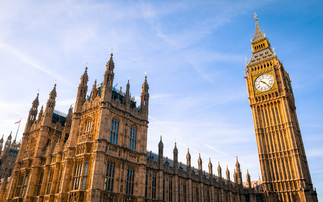A Corbyn-led coalition of climate action could deliver a huge boost to the low carbon economy, but at the same time sensible Conservatives may hold the key to the country's future
Who to vote for? It is the fundamental question in a democracy. As the UK wrestles with its biggest peacetime challenge in half a century, alongside the biggest security challenge in a generation and the biggest environmental challenge in human history, getting the answer right has rarely felt more important.
And yet at the end of this dispiriting and tragically devastating election season any undecided voters still face more questions than answers.
This has been a bizarre and disorienting campaign. It was called in brazen pursuit of a landslide victory by a Prime Minister who had previously ruled out an early election. It was centred on the premise the current Number 10 team embodies strength and stability, and yet it has torched Theresa May's brand and brutally exposed her myriad flaws.
It is quite some feat to tout your sure-footed leadership, only to undertake a policy u-turn mid-campaign, promise you have the best plan for Brexit while refusing to provide any details, suggest a nurse is being naïve to object to real term pay cuts, and then respond to a terrorist atrocity with a fatuous sound bite that only invites people to ask whether enough was done to keep the public safe. May is still the odds on favourite to return to Downing Street with a handy majority, but she does so a chastened figure with major questions hanging over her judgement and temperament. Leadership chatter is already audible in Parliament's corridors.
Meanwhile, Labour's Jeremy Corbyn has surprised almost everyone - including many of his supporters - by running a positive campaign that largely confounded his many critics. And yet, anything other than a brave defeat is still the longest of long shots. Too many of his frontline team look under-briefed and unprepared for high office, while his overt pacifism and long history of dubious acquaintances appears perfectly engineered to alienate the very swing voters in marginal seats outside of London that Labour desperately needs to win.
Overshadowing all of this has been Brexit - an issue that only a handful of politicians have attempted to wrestle with beyond the level of tautological inanity. The issue that will define the next parliament has barely been given a hearing.
The so-called 'party of business' has boxed itself into a position where it is flirting with the Hard Brexit outcome business leaders most fear. But if executives look across the aisle they find a party which, yes, wishes to deliver a softer Brexit, but which is also pursuing a programme of tax hikes and nationalisations that remains anathema to most corporates. Yes, that's a recital from the world's smallest violin you can hear, but the business community is not being particularly well represented at this election.
Faced with this messy political landscape, who to vote for? Elections are not single issue referenda (we've seen how much damage they can do), but if you were to vote based solely on the question of what is best for the green economy, who should you back?
Sadly, the answer, like everything else in this most confusing of elections, is anything but simple. As Timothy Garton-Ash argues in today's Guardian this is an election that demands people vote not tactically, but strategically.
The obvious place to start is with the parties offering the most impressive environmental manifestos and the most clarity on the type of Brexit they want to deliver.
As ever, the Greens push the policy envelope hardest with proposals for a shortened working week and universal income. These ideas may look outlandish now, but given global economic and technological trends they could become mainstream thinking over the next decade. The Party has also noticeably softened its anti-business tone under the leadership of Caroline Lucas and Jonathan Bartley and boasts an impressive track record of both challenging ministers on environmental issues and edging the Overton Window in a sustainable direction. If you live in Brighton Pavilion or Bristol West then the chance to ensure the Party secures the strongest possible voice in parliament is too good to turn down.
Similarly, the Lib Dems' wider campaign may have struggled to fire, but their manifesto's green credentials are exceptional. The promise of five Green Laws - a Green Transport Act, Zero-Carbon Britain Act, Nature Act, Green Buildings Act, and Zero-Waste Act - are precisely the kind of clear cut policy measures the UK's green economy needs. They would deliver long term clarity to a sector too often undermined by policy instability.
Equally, the ambitious goals for full decarbonisation and zero emission fleets coupled with the willingness to invest what are relatively small, but still transformational, sums in low carbon infrastructure confirms the Party is properly engaged with what climate action actually requires. Where the Lib Dems can win they deserve the support of environmentalists.
The SNP and Plaid also remain firm friends of the green economy, even if the SNP's progressive climate policies are always offset by its love in with the oil industry. The nationalists' appeal rests on where you stand on the future of the union, but on green issues both parties could yet play a key role in attempts to revive the onshore wind industry and avert an environmentally-damaging Hard Brexit.
However, the UK's electoral system means the freedom to meaningfully vote for the party with the boldest environmental agenda is geographically limited. All the movement in the polls suggests most people have calculated this election is a straight choice between the Conservatives and Labour, leading to a serious squeeze on the smaller parties.
For environmentalists and green businesses you would think this binary choice is a no brainer.
Labour is promising to ban fracking, orchestrate a surge in renewables investment, make energy efficiency an infrastructure priority, introduce a Clean Air Act, condemn Donald Trump's planetary-level recklessness, and ensure EU environmental protections are retained and enhanced post-Brexit.
In contrast, the Conservatives may remain committed to the Climate Change Act and wider clean tech investment, but they are also promising to fast track fracking projects, block onshore wind in England, double down on support for North Sea oil and gas, and hold a vote on whether to tear up every fox they can lay their hands on. More important still, the Conservative leadership has next to nothing to say on air quality, waste policy, solar and tidal power, Trump's assault on the Paris Agreement, post-Brexit environmental standards, or the long term decarbonisation strategy the UK urgently needs.
The dividing line is so explicit that there are compelling environmental reasons to hope that Jeremy Corbyn can form a coalition of climate action come Friday morning.
But on closer inspection the choice is not quite as clear cut as it first appears. There is a lot for green businesses to like in Labour's green vision, but its economic strategy will inevitably alienate many business types. The plans to nationalise much of the energy industry look like an unnecessary distraction for a sector in the midst of massive technological flux. John McDonnell's proposed assault on 'corporate welfare' is in large part an attack on the grants and incentives that help accelerate clean tech innovation. The funding for much of Labour's green programme is based on some heroic assumptions about future tax take and a pretty cavalier approach to the deficit. More broadly, Corbyn may be an energetic campaigner, but his day-to-day performance as leader of the opposition hardly inspires confidence he is the man to successfully undertake the complex task of transforming the economy.
On the other hand, there are good strategic reasons to endorse Conservative candidates who are committed to delivering climate action and a sensible, measured approach to Brexit. David Cameron's plea that you should vote Conservative to ensure Theresa May can "stand up to people who want an extreme Brexit" is surreal if you think about it. He is basically saying 'vote Tory to protect the Prime Minister from Tories'. But what if the Conservative candidate in your constituency is one of the extreme Brexiteers, Dave? What then?
However, for all the characteristic flaws in Cameron's argument, he has a point. If, as the polls suggest, the Conservatives are on course for victory the worst case scenario would be a slender majority that obliterates the Prime Minister's already tarnished authority, invigorates the climate and eurosceptic wing of the party, and drastically increases the chances of one of the populist chancers from the right of the party succeeding May.
A new Conservative government would face immediate internal struggles over everything from the nature of the Brexit deal to the numerous green questions the manifesto ducked. Decisions will need to be taken soon on the promised Clean Growth Plan, prospects for wind power in Scotland and tidal power in Wales, long term funding for clean energy, the currently inadequate Clean Air Plan, and the much delayed 25 Year Plan for Nature.
The Conservative manifesto offers encouragement to green businesses, especially in the form of the significant pledges on R&D and electric vehicle funding, the promise of a more activist industrial strategy, and the unequivocal backing for long term decarbonisation. However, the deferral of crucial green policy decisions, the proposed review of energy costs, and the carefully-worded commitment to "meet our 2050 carbon objective" that fails to mention nearer term goals can be interpreted as a triangulating attempt to leave the door ajar for those Tory climate sceptics who want to tear up current decarbonisation policies.
In this context, voting for a Conservative candidate who promises to push the leadership hard to make the bold, progressive decisions on environmental issues and avert a self-harming Brexit could be eminently sensible.
So, there we have it. Based on the constituency, your candidate, and your reading of the likely outcome, green executives should vote Green, or Lib Dem, or SNP, or Plaid, or Labour, or Conservative. There is, however, one bit of firm advice that stands in every circumstance. Whatever you do, don't vote UKIP, they've done more than enough damage already.









